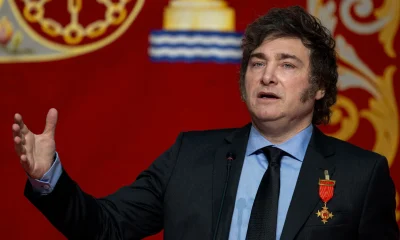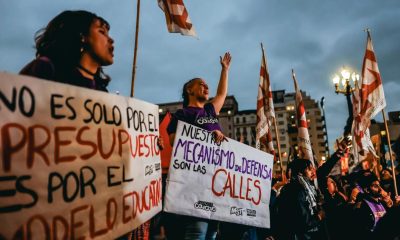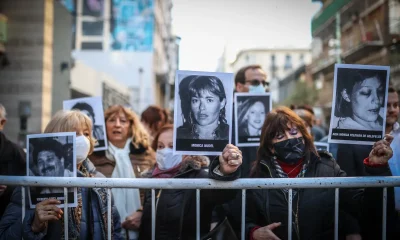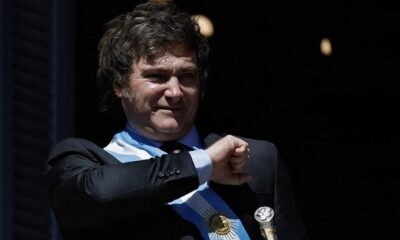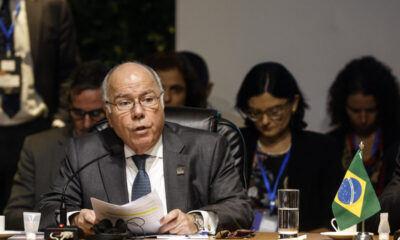International
Milei presents package of laws to Congress on day of demonstrations against him
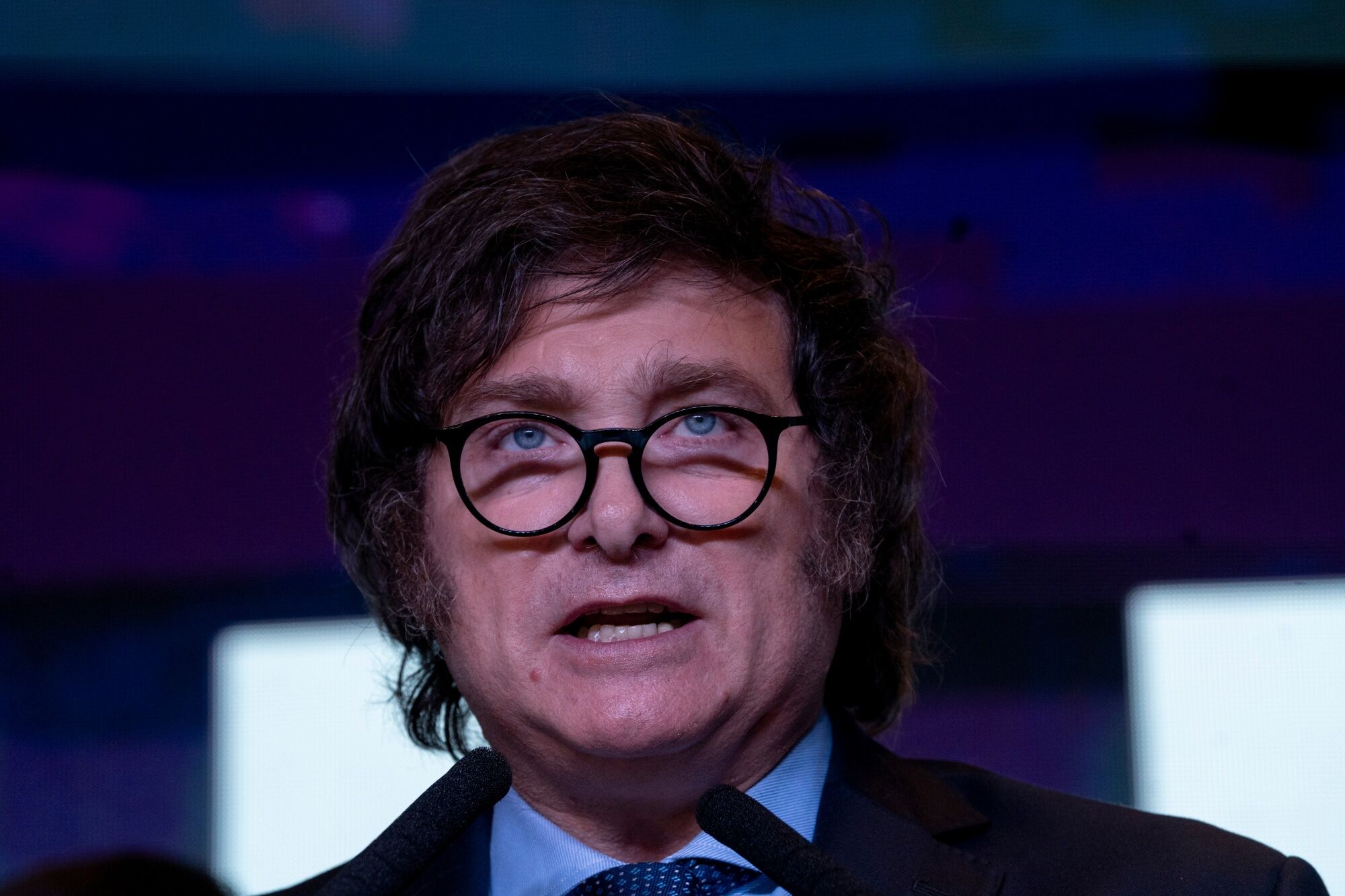
December 28 |
The President of Argentina, the ultra-liberal Javier Milei, presented this Wednesday to Congress a package of laws, texts which contemplate the deregulation of the economy after the decree approved by the President last week, measures which provoked demonstrations against him and which so far resulted in six arrests.
Convened by the main labor centers, thousands of people gathered in front of the Palace of Tribunals in Buenos Aires to demand that the decree published last week to reform or repeal more than 300 regulations be declared unconstitutional.
“We do not question the legitimacy of President Milei, but we want him to respect the division of powers. Workers have the need to defend their rights when there is an unconstitutionality,” Gerardo Martínez, secretary general of the construction union, one of those who led the demonstration which was also joined by social organizations, told the press.
This initiative will come into force on Friday, within the framework of a strong fiscal adjustment that has already implied a devaluation of the peso of more than 50%.
“We have come to say no to the decree because it takes away one of the powers of the State, the Congress”, said to AFP Adrian Grana, one of the demonstrators for whom the presidential initiative “is a decalogue to favor the powerful to the detriment of the people”.
The demonstration developed peacefully until after midday, when a group of people had small altercations with police officers who were trying to prevent them from closing a street.
Six demonstrators were arrested, according to the press.
The Minister of the Interior, Guillermo Francos, delivered to parliament a draft “omnibus law”, which includes a reform of the electoral system and the tax system, in addition to allowing the privatization of public companies, among other measures.
“We promote these reforms in the name of the May Revolution of 1810 and in defense of the life, liberty and property of Argentines,” Milei wrote in his X account when announcing the legislative project that completes his decree.
Congress opened extraordinary sessions on Tuesday to deal with these laws.
Milei, who took office on December 10 with the promise to reduce State spending, has already announced that he will not renew the contracts of 7,000 public employees.
The President hopes that the adjustment of public spending will reach the equivalent of 5% of the Gross Domestic Product (GDP).
The decree limits the right to strike, modifies labor agreements and the system of severance pay, also repeals laws protecting consumers against abusive price increases when annual inflation exceeds 160% and 40% of the population live in poverty.
“Today we are going to court, but there is another chapter focused on the Congress that will have to give a deep debate” on the content of the decree, said Gerardo Martinez.
The union leader urged the government to “form a collective tripartite dialogue table with employers and unions, as other countries that have gone through a severe adjustment have had”.
The Congress, where the ruling party is the third minority, can invalidate the decree, but this would take several months.
The initiative repeals the retirement mobility law and the law regulating rents, frees the price of bank commissions and punitive rates for debts and allows sports clubs to become corporations.
“It is destructive of all labor rights. The Argentine people elected Milei as president of the Nation, not as emperor,” criticized Martín Lucero, a 45-year-old teacher who came from Rosario to support the march.
Last week the courts opened a file to analyze a collective appeal against the decree.
“All the measures go right through me, they are going to starve us,” said Sofía Julián, a 33-year-old employee who came to the march from the southern outskirts of Buenos Aires. “We are united and organized and we are going to continue fighting to oppose the decisions taken by this government against the Argentine people,” she added.
International
Police investigate deaths of Rob Reiner and wife as apparent homicide
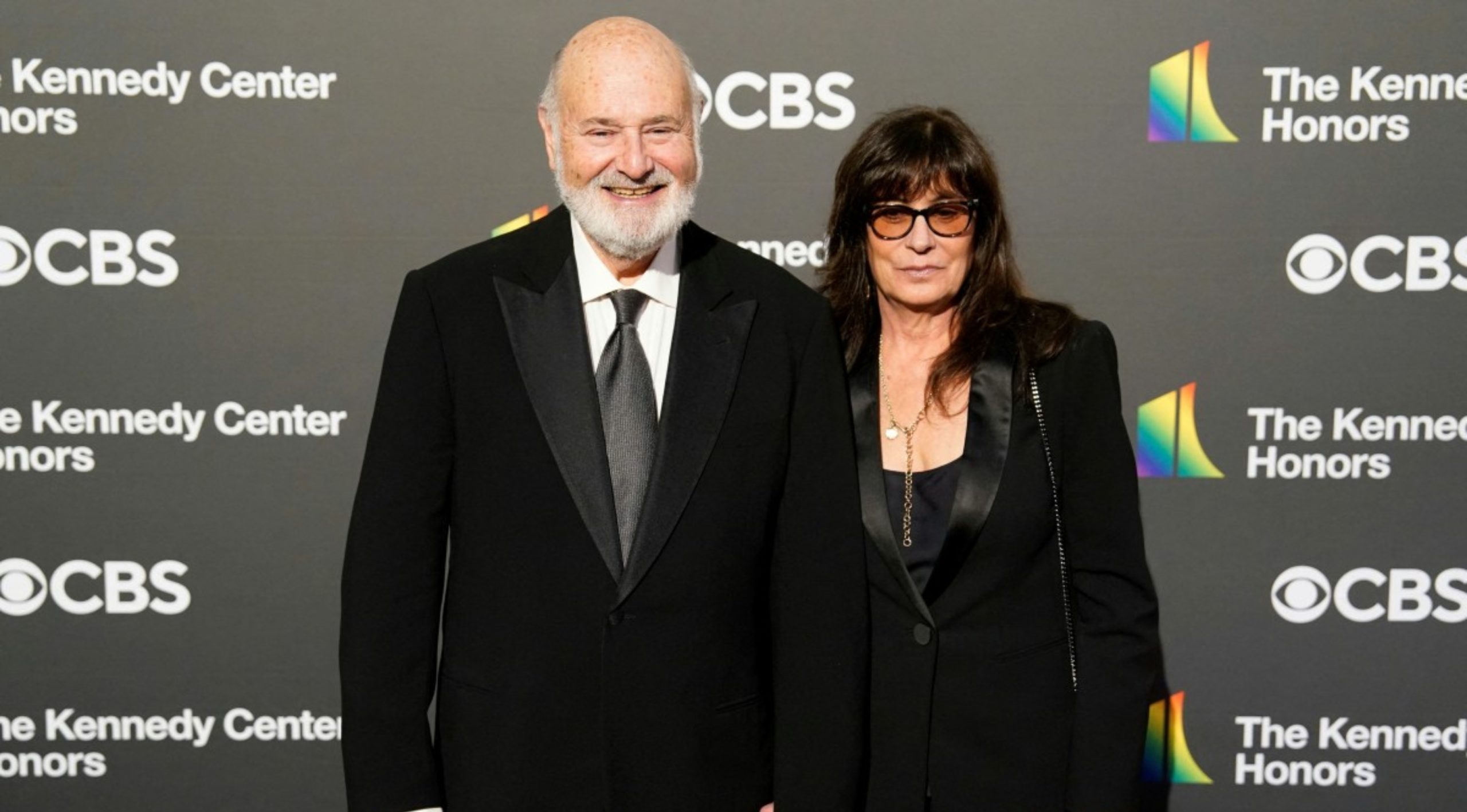
The Los Angeles Police Department (LAPD) is investigating the deaths of Hollywood actor and filmmaker Rob Reinerand his wife as an “apparent homicide,” amid a wave of tributes to the director of classics such as When Harry Met Sally.
According to U.S. media reports on Sunday, Rob Reiner and Michele Singer Reiner were found dead at their Los Angeles mansion with what appeared to be stab wounds.
Several political figures shared messages of condolence following the reported deaths of the director of A Few Good Menand his wife.
While the LAPD did not officially confirm the identities of the victims, it stated that homicide detectives were dispatched to the Reiner residence.
“At this time, no additional details are available and the investigation into an apparent homicide is ongoing,” the Los Angeles Police Department said in a statement posted on social media.
LAPD Deputy Chief Alan Hamilton told reporters that no arrests have been made and that no individuals are currently being questioned as suspects.
“I’m not going to confirm whether anyone is being questioned at this moment or not. We are going to try to speak with as many family members as we can,” Hamilton said.
CNN reported that a family spokesperson confirmed the deaths of Reiner and his wife.
California Governor Gavin Newsom, former U.S. President Barack Obama, and former Vice President Kamala Harrisissued statements expressing their condolences.
International
U.S. and Mexico Reach Deal to Address Water Deficit Under 1944 Treaty

The United States and Mexico have reached an agreement to comply with current water obligations affecting U.S. farmers and ranchers and for Mexico to cover its water deficit to Texas under the 1944 Water Treaty, the U.S. Department of Agriculture said in a statement.
The department уточified that the agreement applies to both the current cycle and the water deficit from the previous cycle.
On Monday, U.S. President Donald Trump accused Mexico of failing to comply with the water-sharing treaty between the two countries, which requires the United States to deliver 1.85 billion cubic meters of water from the Colorado River, while Mexico must supply 432 million cubic meters from the Rio Grande.
Mexico is behind on its commitments. According to Washington, the country has accumulated a deficit of more than one billion cubic meters of water over the past five years.
“This violation is severely harming our beautiful crops and our livestock in Texas,” Trump wrote on Monday.
The Department of Agriculture said on Friday that Mexico had agreed to supply 250 million cubic meters of water starting next week and to work toward closing the shortfall.
Agriculture Secretary Brooke Rollins, quoted in the statement, said Mexico delivered more water in a single year than it had over the previous four years combined.
Trump has said that if Mexico continues to fall short of its obligations, the United States reserves the right to impose 5% tariffs on imported Mexican products.
Mexico’s Deputy Foreign Minister for North America, Roberto Velasco, said that a severe drought in 2022 and 2023prevented the country from meeting its commitments.
International
Several people shot in attack on Brown University campus

Several people were shot on Saturday in an attack on the campus of Brown University, in the northeastern United States, local police reported.
“Shelter in place and avoid the area until further notice,” the Providence Police Department urged in a post on X. Brown University is located in Providence, the capital of the state of Rhode Island.
U.S. President Donald Trump said on his social media platform Truth Social that he had been briefed on the situation and that the FBI was on the scene.
At 5:52 p.m. local time (11:52 p.m. GMT), Brown University said the situation was still “ongoing” and instructed students to remain sheltered until further notice.
After initially stating that the suspect had been taken into custody, Trump later posted a second message clarifying that local police had walked back that information. “The suspect has NOT been apprehended,” the U.S. president said.
-

 International4 days ago
International4 days agoWashington declares State of Emergency as atmospheric river brings severe flooding
-

 International4 days ago
International4 days agoU.S. to require five-year social media history from tourists under Visa Waiver Program
-

 Central America4 days ago
Central America4 days agoHonduras election crisis deepens as CNE president denounces intimidation attempts
-

 Central America4 days ago
Central America4 days agoOAS and EU urge honduran political actors to respect vote results and avoid unrest
-

 International4 days ago
International4 days agoCuba battles out-of-control dengue and chikungunya epidemic as death toll rises to 44
-

 International4 days ago
International4 days agoColombia says it would not reject Maduro asylum request as regional tensions escalate
-

 International2 days ago
International2 days agoSeveral people shot in attack on Brown University campus
-

 International4 days ago
International4 days agoEcuador on track for record violence as homicides hit highest level in Latin America again
-

 International4 days ago
International4 days agoSix ecuadorian soldiers jailed pending trial for alleged extrajudicial execution
-

 International6 hours ago
International6 hours agoPolice investigate deaths of Rob Reiner and wife as apparent homicide
-

 International2 days ago
International2 days agoU.S. and Mexico Reach Deal to Address Water Deficit Under 1944 Treaty
-

 Central America19 hours ago
Central America19 hours agoPanama seizes over three tons of drugs hidden in Caribbean port container
-

 Central America7 hours ago
Central America7 hours agoOAS urges swift recount in Honduras as election results remain uncertain



































